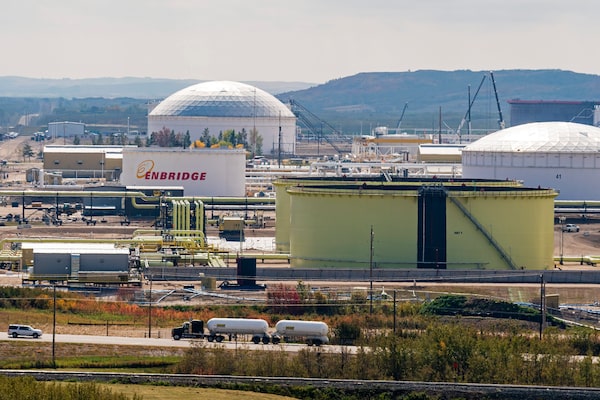
A high-angle view of Enbridge and Gibson Energy petroleum storage tanks and pipelines at the Canadian energy storage and pipeline transportation hub in Hardisty, Alberta on Sept. 11, 2018.Bayne Stanley/The Canadian Press
Former Bank of Canada governor Mark Carney says the private finance sector will play a crucial role in helping countries – including Canada – hit their goal of net-zero greenhouse gas emissions by 2050.
Mr. Carney, the United Nations Special Envoy for Climate Action and Finance, says companies such as BP PLC and Royal Dutch Shell PLC are already weighing which fuel sources to focus on now, and which ones will factor heavily into the future as countries transition toward cleaner energy to meet climate-change targets.
“Canada is an energy superpower," Mr. Carney told media recently. "It is an energy superpower because it is oil and gas, it is hydro, it is hydrogen and it is carbon capture and storage and nuclear and beyond.” He added that the country must establish a framework of how to best develop its fuels according to their carbon footprint and competitiveness.
Canada, like more than 120 other countries, is aiming for net-zero emissions by 2050. Speaking to media before his address to the Green Horizon Summit on Monday, Mr. Carney said banks, insurers and investors will be key to meeting that target.
The summit is a gathering of chief executive officers, policy makers and governments focused on finding the financial innovation necessary to hit climate targets. Its work will play into discussions at next year’s COP26 conference in Glasgow, a gathering about climate change and plans to tackle it.
Many banks, investors and lenders already track companies to see if – and how – they are addressing climate change by asking about net-zero strategies, aggregating the data and making capital allocation judgments accordingly, Mr. Carney said. He gave as an example the Net Zero Asset Owner Alliance, a group of 30 institutional investors that oversee $5-trillion in assets with explicit objectives of reducing carbon footprints.
Climate change risks have already resulted in “big write-offs" of assets by major oil companies, Mr. Carney said, “not just because the oil price is low today, but because they expect the economics of high-carbon energy to be much less attractive in the future.
“There is definitely increasing differentiation between different fuels, different energy," he said. “People are being rewarded if they are seen to be addressing the transition.”
The result hasn’t been great news for the Alberta oil patch. European financial institutions, including Deutsche Bank and Zurich Insurance Group Ltd., have pulled back from Canada’s energy sector, and Norway’s US$1-trillion sovereign wealth fund earlier this year excluded Canadian Natural Resources Ltd., Cenovus Energy Inc., Suncor Energy and Imperial Oil Ltd. from its portfolio over “unacceptable greenhouse gas emissions.”
Many Canadian companies already have emissions-reduction targets. On Friday, Enbridge Inc. announced its goal to reach net-zero greenhouse gas emissions by 2050, with an interim target for reductions of 35 per cent by 2030. It is also linking progress on its environmental, social and governance goals to employee and executive compensation.
Alberta Premier Jason Kenney and Environment Minister Jason Nixon have dismissed the idea of developing a net-zero target for the oil-producing province, pointing to plans like that of Enbridge as evidence companies are already moving to address climate change.
Still, Mr. Carney said, “it’s hard to see a credible medium-term economic strategy and advanced economy that does not have sustainability at the core of it.
“It just is where the money is, where the opportunity is. That holds for Canada and holds for the U.K. and it will hold for the U.S.,” he said.
He said he also believes the sector must ensure every decision takes climate change into account. Just as a bank assesses a company’s credit and business outlook before approving a loan, Mr. Carney said, it should also consider the company’s risks or opportunities in the transition to net-zero emissions.
To that end, Mr. Carney will unveil a fiscal framework at the summit on Monday to help guide the private finance sector to support the global economic pivot needed to reach net-zero.
Mr. Carney’s framework focuses on four key areas: Improving the quantity, quality and comparability of climate-related reporting; ensuring the financial sector can measure and manage climate-related financial risks; helping investors identify the opportunities in the transition to net-zero and report how their own portfolios are aligned for the transition; and increasing private financial flows to emerging and developing economies.
Despite major progress in recent years, the framework says, “more is required to build the right frameworks for the private sector to do what it does best: allocate capital to manage risks and seize opportunities.”
Your time is valuable. Have the Top Business Headlines newsletter conveniently delivered to your inbox in the morning or evening. Sign up today.
 Emma Graney
Emma Graney